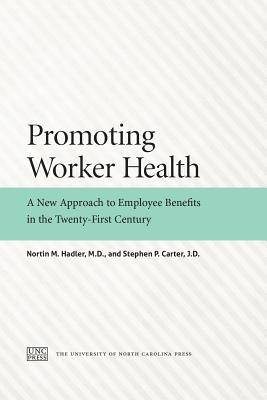
- Afhalen na 1 uur in een winkel met voorraad
- Gratis thuislevering in België vanaf € 30
- Ruim aanbod met 7 miljoen producten
- Afhalen na 1 uur in een winkel met voorraad
- Gratis thuislevering in België vanaf € 30
- Ruim aanbod met 7 miljoen producten
Zoeken
Promoting Worker Health
A New Approach to Employee Benefits in the Twenty-First Century
Nortin M Hadler, Stephen P Carter
Paperback | Engels
€ 7,95
+ 15 punten
Omschrijving
In this extended essay, Nortin M. Hadler and Stephen P. Carter introduce a new approach to reforming the American health-care system--a plan they call the Universal Workers' Compensation Model (UWCM). Drawing on Hadler's expertise as a physician and Carter's as an attorney, the two have conceived the UWCM as a state-level alternative that would supersede current solutions debated at the national level. They begin by summarizing the history and present complexity and irrationality of America's health-insurance system. They then lay out the key concepts underlying the UWCM regime and the practical policy steps necessary to enact it. At the heart of the UWCM is a broader understanding of what constitutes worker's health, one grounded in scientific research and cognizant of the wide range of physical and mental illnesses that can afflict workers. The UWCM stipulates a single policy providing rational and reasoned recourse for universal risks: illness, injury, disability, and death.
Presenting their ideas with precision in this 34-page pamphlet, Hadler and Carter intend to spark discussion among health-care providers, insurers, legislators, and everyday citizens about how we might move beyond the limits of the current debate toward new, truly effective solutions.
Presenting their ideas with precision in this 34-page pamphlet, Hadler and Carter intend to spark discussion among health-care providers, insurers, legislators, and everyday citizens about how we might move beyond the limits of the current debate toward new, truly effective solutions.
Specificaties
Betrokkenen
- Auteur(s):
- Uitgeverij:
Inhoud
- Aantal bladzijden:
- 34
- Taal:
- Engels
Eigenschappen
- Productcode (EAN):
- 9781469650968
- Verschijningsdatum:
- 25/06/2018
- Uitvoering:
- Paperback
- Formaat:
- Trade paperback (VS)
- Afmetingen:
- 152 mm x 229 mm
- Gewicht:
- 68 g

Alleen bij Standaard Boekhandel
+ 15 punten op je klantenkaart van Standaard Boekhandel
Beoordelingen
We publiceren alleen reviews die voldoen aan de voorwaarden voor reviews. Bekijk onze voorwaarden voor reviews.











